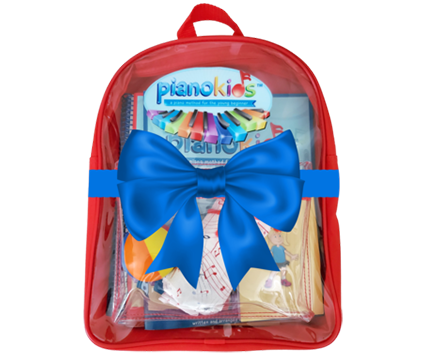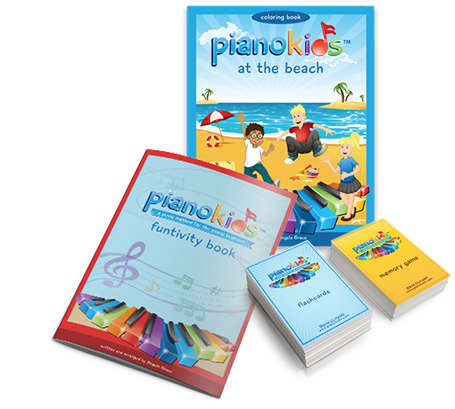




Yes, you can start your young one on the keyboard, but as a long-time piano teacher, I will give it to you straight. Your child's little fingers need to develop strength from the very beginning so they can feel comfortable playing with one finger at a time very quickly. A keyboard with a light touch does not have heavily weighted keys, so playing on that instrument for too long promotes sloppy playing and slower coordination development. For your child's benefit, if you need to purchase a keyboard now, please continue to save and buy a used digital piano with heavy-weighted keys within three months of starting piano lessons for children. I like digital pianos for younger students because you can use other instrument sounds to play the songs after they practice on the piano tone, which brings more fun into practice. Another great benefit is this: digitals stay in tune permanently. But don't get me wrong, a good acoustic piano (regular piano with hammers and strings inside) is a great addition to any family and home. Just be sure it's tuned when you move it and again about every couple of years thereafter. By the time you can hear it, it's been out of tune for too long.
Any program that can be shared by more than one child is nothing like what you will get with Pianokids program. As a private teacher, I have never taught siblings out of the same method books, not even good friends or neighbors of the same age. Why? Because I have always believed in an individualized approach for every child so you can expect the same from this program created for your family. The Pianokids books are colored, worked in, and calendared with stickers by each child and the online Piano Studio tracks the progress of each child individually. When each child marks 12 practices in the online Practice Record, we'll send them a prize box. Not every child in the family practices the same amount for a prize at the same time. In fact, this can be a big motivator when the one who is more diligent with practicing gets rewarded sooner. This has a funny way of motivating the other child quickly.
Along with their physical rewards, we have also included online activities and games that we use for practice motivation with personalized tracking. Even when they login to the online Piano Studio, the digital blackboard welcomes them personally with their name.
The Lesson Plans book in the curriculum is the only book that is created for the parent. Honestly, you should use one for each child so you can make notes regarding where they are individually: in each lesson plan.
Therefore, to enjoy the benefits of our unique piano program, each young beginner needs their own set of books, materials, piano backpack and online Piano Studio login. This keeps their Pianokids materials together to fully participate in the wonderful piano teaching experience and practice motivation features we have created.
We understand that life happens that causes interruptions in the best-made plans. Pianokids will suspend your Piano Studio subscription for up to three months to give you time to resume your routine piano practice with our program. Our mission is to help make music an important part of life for children and their families, so we will help to preserve the efforts made in the program, allowing you to continue the fun piano experience soon. If a suspension needs to be longer than that, a call to our office for further discussion will be needed.
The books have been used for over 30 years before the recently created Piano Studio. When students came to me, I taught them piano concepts using the activities and games I've now shared with you. My online Practice Record duplicates what I've used in my studio to keep students motivated and looking forward to their next reward. Even though the books are self-sustaining, the Piano Studio subscription becomes your personal motivating teaching tool. It is an important asset to keep parents and students motivated to continue to learn the life-enhancing skill of playing piano. That is why we have chosen to sell the books and the subscription together. Now, one should not be without the other.
How do you encourage your child to eat when they don't want to or eat good food instead of ice cream all the time? Music is necessary to the soul, and learning to produce it is good for life. When treating it as a necessary activity, we are more apt to be creative to encourage practicing. A routine is important, if possible, so a child knows when to expect practice time. It will not be a good result if it is forced upon them when they are expecting to watch their favorite TV show or go outside. It is up to the parent to be sure practice time is comfortable and consistent so the child will have the best attitude for practicing. If they are too tired or hungry, forget it. Piano practice is a bit of effort for both the parent and child, so both need to be physically at their best to enjoy the daily Pianokids fun piano lessons. "Let's see what Ms. Erin will tell us today" is a great way to start daily piano practice and pique their interest. Listening to Ms. Erin, their online Virtual Piano Teacher, in the online Piano Studio repeatedly helps them relate to their own piano teacher instead of mom or dad telling them more things to do. Just like parents say with schoolwork, using the reward of "we can go play…read…go to grandma's if we practice our piano first" tells them that they will get something fun soon but not without practicing (read a great story about this on our blog). Now that you have the Piano studio with games and activities, practicing doesn't have to be that much work.
Yes, please allow your child to enjoy having their own piano teacher. Our Beta Test proved that students loved watching their teacher, Ms. Erin, talk about the lessons. Now that we have added so much more in the way of activities that encourage them to practice–and reward them when they do–every child should have the benefit of using this great and enjoyable resource.
The piano is one of the easiest musical instruments for kids because every key makes its own distinct sound, and it's fun to play. Just sit your young one in front of the ivories and watch! Your child will play happily on the keys for as long as you allow. Piano lesson plans for kids can bring your child an indescribable sense of joy and fulfillment and instill a lifelong love for music. How playing an instrument benefits your brain: Besides the "fun" aspect, researchers agree that children who start playing at a young age show increased cognitive, memory, and language skills. Learning the keyboard develops temporal-spatial ability, which relates to math, engineering, and science. It sharpens concentration and improves emotional intelligence, self-esteem, and perseverance. Playing an instrument also enhances listening skills and improves social skills: being a good listener never goes out of style! In short, it's like a mega-boost for your child's overall development, happiness, and future success!
Introducing a preschool child to piano allows them to learn when their brains are most open to new experiences. It also allows them to absorb new knowledge and skills more quickly than at any other time in life. While the best starting age may differ from one child to another, scientific research on the topic of early-age music lessons documents that before age seven, there exists "a developmental window where experience has long-lasting effects on the brain and behavior."
There is no set learning schedule since every child is different and learns at their own pace. Preschool learners work at a different speed than grade-school students. For typical three-to-five-year-old beginners, the first month will be spent laying the foundation and getting familiar with the keyboard. After that, they'll be playing simple songs within weeks.
This depends on the program, just as in-person lessons depend on the teacher. Pianokids founder Angela Grace has over 35 years of experience teaching music to children and has spent ten years beta-testing the Pianokids teaching methods and program before it was publicly released in August 2020. Pianokids offers the same quality of instruction as private lessons at a fraction of the cost.
Yes, private lessons average $30-$60 per hour, and slightly less for children’s group lessons. That’s why online music lessons have become so popular.
When it comes to the music world, the piano reigns supreme and has had more impact on Western music than any other instrument (except the human voice). Before the days of radio and television, the piano was the center of home entertainment! Improved brain development and memory aside, people today love playing the keys for the same reasons as in past centuries: It's fun and produces sounds like nothing else on this planet.
Playing keyboard is good for your health! It benefits the brain, decreases anxiety, and helps to regulate body functions and organs.
The ivories are good for emotional and mental health, and triggers actual serotonin release (the “feel-good” brain chemical)!
Pianokids incorporates colors, numbers, online piano games, along with video lessons and personal input by virtual teacher Miss Erin, to keep young minds active, happy, and engaged. Our program enables parents and caregivers, musical or not, to teach their children piano. To learn more, click here, and see our curriculum here.
